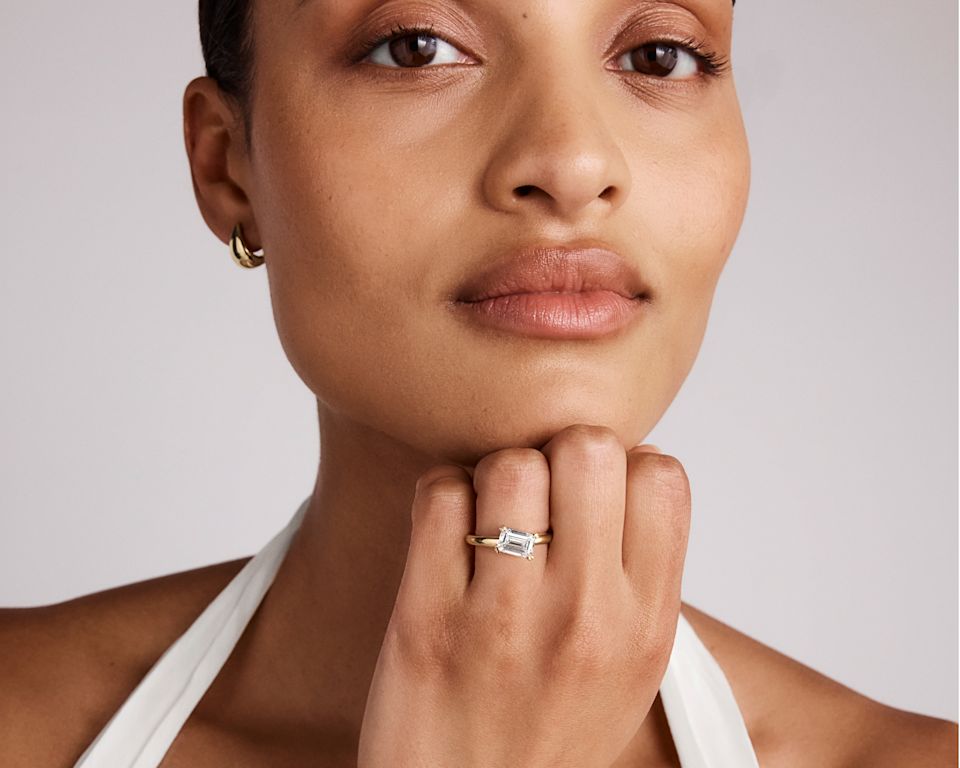Round Brilliant Cut
The most popular and classic diamond shape, round brilliant cuts feature 58 facets designed for maximum light return.

One of the most iconic and coveted gemstones, a diamond's uniqueness is derived from its cut, carat, colour and clarity. Each diamond possesses its own beautiful blend which determines its brilliance, rarity, and value, with no two stones being exactly alike.
Beyond the Four Cs of diamonds, there are also shapes, settings, and your choice of diamond type to consider.
Discover our guide to diamonds at Michael Hill, to inspire your journey in finding the perfect engagement ring, gift, or forever-piece for yourself.
The cut of a diamond is usually associated with its shape – such as round brilliant, princess cut, pear cut, and so on. When it comes to the Four Cs, a diamond’s cut grading refers to how well it has been cut; which takes into account proportions, symmetry, and polish. An expertly cut diamond will make the best use of light, reflecting and dispersing light that enters the stone into brilliance (brightness), fire (coloured light), and scintillation (moving light – also known simply as sparkle). While only round diamonds receive a cut grading, fancy shapes each have their own unique aesthetic appeal and play of light, so you can choose the look you love for your forever-piece.
In white diamonds, it’s a lack of colour that makes stones more highly valued and sought-after. The lesser the colour, the higher the grade of diamond. The recognised industry standard for diamond colour grading was developed by the GIA (Gemological Institute of America) and places diamonds on a scale from D – Z; with D being absolutely colourless and the highest grade possible, to Z having a noticeable degree of colour.
Every diamond is unique, and tiny, natural imperfections arise during formation. The GIA Clarity Grading Scale ranges from Flawless (F) to Included (I). The fewer inclusions, the higher the clarity grade – with Flawless diamonds being rare and highly valued. In diamonds with a clarity grade of SI (Slightly Included) or higher, these inclusions are generally not visible to the naked eye. Diamond cuts with multiple, smaller facets – such as round brilliant – can also make inclusions less noticeable, while shapes possessing fewer facets – like an emerald cut – are at their best with a higher clarity grade.
Often associated with size, carat is in fact a measurement of weight. One carat equals 1/5 of a gram. In a solitaire setting, the carat weight refers to the weight of your single diamond. In a jewellery style with multiple stones, the total carat weight (TW) indicates the combined weight of all individual diamonds in the piece.

As well as deciding on the diamond characteristics and aesthetics for your perfect piece, the modern approach to fine jewellery allows you to choose the type of diamond that’s right for you. Laboratory-grown diamonds share essentially the same chemical, physical, and optical properties as natural diamonds: the difference lies in their origin.
At Michael Hill, our laboratory-grown diamonds are certified sustainability rated and climate neutral, in accordance with the SCS-007 Jewellery Sustainability Standard Series – Sustainability Rated Diamond from SCS Global Services.
With a silhouette similar to a round cut, our signature diamond cut is expertly crafted into a star shape with 101 facets, creating our brightest diamond.
The eternally iconic engagement ring style, a solitaire ring features a single diamond paired with a precious metal setting.
A timeless engagement ring style with designs that can range from simple to intricately detailed, a halo style surrounds your centre diamond with a ring of smaller stones to amplify its appearance.
As the name indicates, three stone engagement rings comprise a trio of diamonds, which may feature the same diamond cut or a mix of shapes.
A side stone ring enhances the beauty of your engagement ring centrepiece, with a trail of diamonds set into the ring band.
Cluster engagement rings feature multiple small diamonds and/or gemstones, which can be set to resemble a larger stone or arranged into unique and beautiful shapes.
Vintage style engagement rings take inspiration from romantic, timeless designs with unique detailing such as floral-shaped halos or Art Deco-influenced designs.
We'll give your old gold new life, and you a Gift Card to use on a new piece of jewellery.
Our promise to you, providing you with the reassurance to shop with confidence and enjoy your diamond jewellery for life.
We create fine jewellery to mark life's most meaningful moments. Discover our dedication to craft.